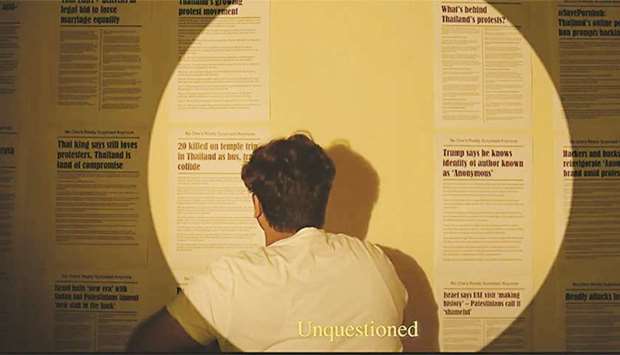Students produce multimedia exhibition on colonialism’s effect on educational systems today
Students at Northwestern Qatar have produced more than 30 multimedia projects – including podcasts, videos, poems, articles and a webinar – that address how education systems are shaped by the political context where they operate, particularly in countries that have experienced colonisation.
The projects, which are exhibited on a class website, provide insight on how systems shaped by colonialism continue to operate globally – including the use of Western curriculums, a lack of diversity among teachers, and discrimination in the classroom based on gender and race.
The exhibition is part of a liberal arts course that introduces students to interdisciplinary learning, where they reflect on what they know and how they know it, and then analytically think about an issue that affects their lives.
"The class – 'Ways of Knowing' – encourages students to think critically about a given topic – which, this year, is education in the contemporary world," explained Professor Sami Hermez, who is co-teaching the course. "The students theoretically and practically examine how knowledge is produced, who has the authority to produce knowledge, and the colonial context of much knowledge production."
One of the educational concepts that students explored this year is the “banking concept of education”, a term used by Brazilian educator and philosopher Paolo Freire to describe educational systems where students passively absorb information and learning is the memorisation of facts.
Using film that integrates audio and visual components, students Princess Collado and Mohamed al-Khulaifi said their class project expressed their "desire to break free from the system where we are held to absorb knowledge without resistance”.
The film focuses on the issues and challenges of being part of an educational system where critical and objective thinking is non-existent.
Providing another perspective on the same theory, students Aesha Hussein, Asmae Nakib, Linda Feng, and Raghdan Alhennawi interviewed Northwestern Qatar's Kelly Wilson, administrator of the school’s Writing Centre, for their podcast on the importance of freedom in the classroom.
In the interview, Wilson encouraged the students to take ownership of their writing, and to be free with the choices they make.
"Students should be able to take risks in what they're learning. They should be able to learn in ways that are not just about rote memorisation and then regurgitating that information back," she said. "What is lacking in the banking (concept of education) is the willingness to ask questions and to make space for doubt, uncertainty and curiosity, and those three things are fundamental to learning."
Mohamed Shahan Ejaz, William Gitta Lugoloobi, Noura A S AlShantti, and Beatrice Zemelyte analysed the impact of a colonial education system on women through a video, where they examined how and why women were discriminated against, and the role Western colonialism played in promoting the oppression of women.
The film – *Colonialism and the learning experience for women: Past and present – connects the dots between today’s educational systems and the systems used by European colonisers in Africa as a mechanism to "create obedient and civilised members of society", by providing men with an education designed "to produce semi-skilled labour for the colonial economy", while education for women was seen as a waste of money and something that would "undermine the feminine attributes of a woman".
Language, and specifically the English language as the global lingua franca, was the subject of another podcast project that looked at the effect of colonialism on the erosion of cultures, the disappearance of native languages and adaptations to Western influences, especially the preference for Eurocentric beauty standards.
The students – Noura Abdulaziz al-Thani, Shaikha al-Thani, Azma Hasina Mulundika, and Makeda Shimelis Ararso – noted the significance of language in a culture, and how "when one language overpowers another, this consequently results in one culture replacing or altering its predecessor, bringing about numerous elements such as beauty standards".
Professor Torsten Menge, who is co-teaching the course, pointed out that students explored how the legacies of colonialism, including racism, global inequalities, and the dominance of Western understandings of knowledge continue to shape education.
"The final projects allowed students to take a step back and reflect on how their educational journey and their institutions are influenced by the history and ongoing effects of colonialism,” he said. “They came up with some incredibly creative and thoughtful ways to analyse these issues and to convey them to their audience.”

